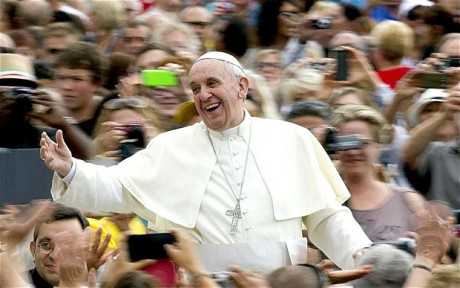It occurred to me today that people confuse me.
“Did you hear what the pope said?” is probably a question you have already heard or will hear sometime in the future. “Apparently, you don’t need to believe in God in order to go to heaven. You simply need to follow your conscience and do good. Don’t believe me? It’s in papers like this one and this one.” If you have heard words like these, it’s probably from someone antagonistic, apathetic, or curious about the Church and/or pope. Why? Because anyone within the Church will think about that statement for just a little bit and conclude the “summary” is wrong.
This is where I am confused. Why would anyone think that the pope, who is elected to serve the Church as if he were Christ himself (that’s what “vicar of Christ” means), could/would/should say, “You know that Jesus fellow? Well, he’s not all that important. You just need to follow your conscience. Go ahead and believe what you want, but be true to it and you’ll be fine!” Stop and think about how ridiculous it is to think or even expect such words. You don’t even really need to know what Pope Francis really said to make such a conclusion.
Just for fun, what did Pope Francis actually say? It might be interesting to know that you must deliberately search for the translation. All of the English papers reporting on the letter Pope Francis wrote to a newspaper columnist remain void of a link or reference to it. They simply have quotes that they want you to trust are authentic and not taken out of context. (To be fair, one article I found had a link to the Italian letter.) Fortunately, a translation does exist and can be found here. If you take the time to read it, you’ll notice at least the two things I noticed. First, Pope Francis talks about Jesus, faith, and the Church a whole lot. Seems strange for someone who supposedly said they don’t matter anymore. Second, the paragraph getting play in the media is the second to last paragraph in a nineteen paragraph long reply.
Finally, what did he mean? I could write my thoughts, but I thought the words of a Catholic would be better:
Okay, so I’m starting to get a bit frustrated about having to do this every other week. Here’s yet another of my “what the Pope really said” posts.
The mainstream media is going wild about a letter that Francis has written about atheists and agnostics, in which he appears to say that belief in God isn’t a requirement to get into Heaven. Of course, it absolutely is. If you arrive at the pearly gates and still refuse to accept that God exists then the odds are that St Peter won’t let you in. Everyone has to confront that reality at some point in their lives – so only the mad and the stubborn are likely to spend an eternity as unbelievers.
But putting that simple point aside, here’s the controversial bit of the Pope’s remarks:
“The question for those who do not believe in God is to follow their own conscience. Sin, even for a non-believer, is when one goes against one’s conscience. To listen and to follow your conscience means that you understand the difference between good and evil.”
He added that, “the mercy of God has no limits.”
We Catholics believe that nobody should be compelled to share our faith, hence atheists are at liberty to “follow their own conscience.” But we also believe that “conscience” is not a relativist thing that varies from individual to individual. The conscience is the seed of truth implanted in us by God when we are born and anyone who listens to it opens themselves up to the possibility of doing good and – eventually – to finding God. When we see someone in pain, our conscience tells us to help them. That is the “good” in us. If we feel nothing and do nothing for them, that is the “evil” in us. Ergo, the Pope is entirely right to advise atheists to follow their conscience, because that is the path to enlightenment.
What if someone’s conscience tells them that God doesn’t exist and the Pope is a silly man in white peddling antiquated nonsense? Well, we would say that a truly tested conscience will always conclude that the Church offers salvation. But if an individual continues to assert the opposite then they are best advised to be honest about their feelings. One of the greatest sins in the world is to participate in the Church and not really believe in its teachings. That’s a sure way to get to Hell.
Finally, the phrase “the mercy of God has no limits” is important. In the same way that Catholics have faith that the Almighty will forgive them of their sins, so we have faith that he will do the same for others. Maybe he will, maybe he won’t – we don’t know what he’s thinking so we don’t try to second guess him. Believing that the Church offers the keys to the kingdom of Heaven, we do our best to be good Catholics. We often fail.
Is all of the above really so hard to grasp? I’m getting tired of the media’s constant reinterpretation of the Pope’s words, usually with the spin that he’s “liberalizing” the Church. They used to do something similar to Benedict, although in his case they said that he was turning back the clock and was one encyclical away from burning a witch. But maybe the problem isn’t helped by Francis’s constant, hyper-energetic desire to speak to anyone and everyone about everything. For his own good, and the good of all his Church, the Pope needs to let his pen rest for a few days.
